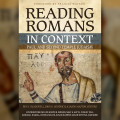


All content
I have been reading Tom Wright’s Into the Heart of Romans: A Deep Dive Into Paul’s Greatest Letter (2023), wondering whether I should make it recommended reading for a course on Romans. I probably will but with caveats.My view is that… ()
I had a conversation last week with an old friend, Scott Lencke, about what I have been calling a “narrative-historical” approach to the reading of the Bible and of the New Testament in particular. Scott has made it available on his new podcast, or… ()
Nothing much to see here, just a footnote to my argument about Jesus being “in the form of a god,” but some people may find it interesting.The opening clause of the famous encomium celebrating the strange career of Jesus in Philippians 2:6-11 is… ()
From my limited perspective (other limited perspectives are available), it appears that the church in the West is changing or being changed quite dramatically. It is adapting to a marginalised and diminished presence by re-imagining the manner of… ( | 1 comment)
Under what circumstances did Paul imagine that “all Israel” would be saved? How did he think it would come about? I want to look at two passages here that point to national disaster as the circumstances and means by which such a reversal… ( | 5 comments)
Paul makes reference in Romans 2:7 to people who “by patience in well-doing seek for glory and honor and immortality” (ESV). Who are they, what are they seeking, and what do they get on the day of God’s wrath? I ask because the question came up in… ( | 5 comments)
I really shouldn’t be going on about this, but I keep running into the same issue, and it is irksome. Reading Romans in Context: Paul and Second Temple Judaism (2015), edited by Blackwell, Goodrich, and Maston, ought to be a useful, if… ( | 1 comment)
There is an obvious contradiction—at least in the popular imagination—between the values of Jesus and the practices of Christendom, and it is not surprising that what is left of the Christendom church in the West now largely views its past with… ( | 2 comments)
I am writing this in hope of offering some encouragement to Liam, who is planning to go to university in September to study theology but is worried that he may be wasting his time.Liam is caught on the horns of a classic dilemma and at risk of… ( | 15 comments)
Paul is in Athens, waiting for Silas and Timothy to join him. His spirit is troubled by the profusion of idols in the city, and he gets into lively disputes about the phenomenon with Jews and God-fearing gentiles in the synagogue on the Sabbath and… ()
The idea of the “eschatological pilgrimage of the gentiles” to a rebuilt temple and restored Zion is well attested in Isaiah especially but is found in other Old Testament and Hellenistic-Jewish writings. Here are three examples, but we could add… ( | 2 comments)
When Paul says, “if you call yourself a Jew” (Rom. 2:17), the traditional understanding has been that this is addressed to a Jew whom he is about to charge with hypocrisy: “You call yourself a Jew but you do this, that, and the other! Shame on you!”… ()
I had a great chat with Sam Tideman recently, following up on a number of posts addressing questions raised in a debate between James White and Dale Tuggy asking “Is Jesus Yahweh?” A previous conversation with Sam addressed “The Preexistence of… ( | 1 comment)
I had a go at explaining the place of the quotation from Psalm 102 as an apparent address to Christ as YHWH in a recent post on the “Is Jesus Yahweh?” debate between James White and Dale Tuggy, but I’m not sure I got it quite right. So I’m going to… ( | 5 comments)
Matthew Poole was a seventeenth century English Presbyterian minister. Towards the end of his life he started work on a commentary on the Bible called Annotations upon the Holy Bible. Wherein The Sacred Text is Inserted, and various Readings… ()
I am writing this in answer to some questions sent to me about the reading of the New Testament presented on this blog and in my books. The specific point at issue is my contention that we now understand the New Testament best if we map most of the… ()
According to James White, when John says that “Isaiah said these things because he saw his glory” (Jn. 12:41), the allusion is to the glory of YHWH revealed in the throne vision of Isaiah 6:1-3. Since John is speaking about Jesus in this passage, we… ( | 6 comments)
How should Good Friday be observed? With mournful solemnity because this is the death of Jesus? Or with subdued but joyful celebration because this is the death of Jesus for our sins?The question came up in church yesterday in… ( | 1 comment)
I’m not sure how much more I can do with the debate between James White and Dale Tuggy over the question of whether Jesus is regarded by the writers of the New Testament to be, in some sense, Yahweh. Tuggy’s approach doesn’t lend itself to the same… ( | 5 comments)
The last passage that James White puts forward in support of his view that the New Testament identifies Jesus with Yahweh is 1 Peter 3:13-17*:And who is harming you if you should be zealots of the good? But if indeed you should suffer because of… ()


















Recent comments